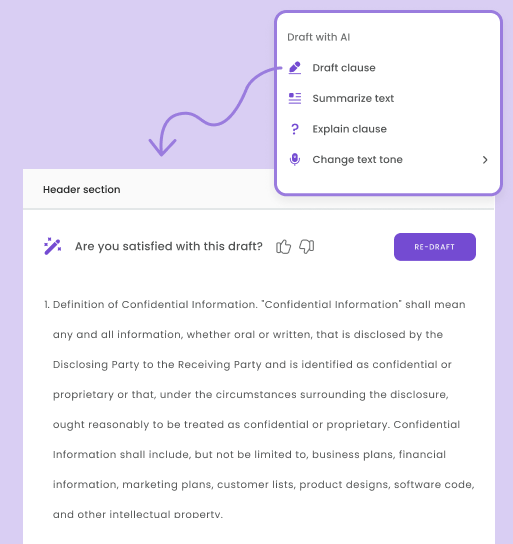Contracts don’t create themselves (well, unless you’re using DoxFlowy). Normally, people are involved in different stages of the process and tie it all together.
This responsibility commonly falls to the contract manager.
The contract manager is an indispensable role that people take on – sometimes without knowing it.
This guide sheds light on what a contract manager is, their key responsibilities, some of the skills they need, and their true importance.
Definition of a Contract Manager
A contract manager someone responsible for overseeing the creation, negotiation, execution, and monitoring of contracts. Their primary role is to ensure that the terms and conditions of contracts are met by all parties involved, and they work to mitigate risks associated with contractual agreements.
Contract managers are present in many industries which include construction, IT, healthcare, and government sectors, where complex and high-value contracts are common.
Keep in mind that the contract manager is a specialized role focused on the lifecycle of contracts within your organization. They act as the bridge between your organization and external entities such as suppliers, clients, and contractors.
This role requires a deep understanding of legal terms, negotiation techniques, and specific business needs. This cross-discipline approach enables a contract manager to make agreements that are advantageous and legally sound.
The contract manager’s goal is to secure the best possible terms while staying compliant with legal and regulatory standards. In other words, get the best deal without cutting corners.
Key Responsibilities and Duties
The key responsibilities of a contract manager include drafting and reviewing contract terms, negotiating with external parties, and ensuring that contracts comply with legal and company standards.
They monitor contract performance so everyone involved meets the agreed-upon obligations and hits the deadlines that were originally agreed upon.
A contract manager must also handle any disputes or issues that arise, working to resolve them efficiently. Additionally, they maintain detailed records of contract documents and communicate regularly with stakeholders to provide updates on contract status.
Risk management is another aspect of their job, as they must anticipate potential problems and devise strategies to mitigate them.
Distinction Between Contract Managers and Related Roles
While contract managers, project managers, and procurement managers may have overlapping responsibilities, their primary focuses differ. A contract manager is specifically concerned with the lifecycle and legal aspects of contracts.
In contrast, a project manager oversees the execution and completion of projects, ensuring that project goals are met on time and within budget. A contract manager may get involved in this aspect when delays are making it difficult to meet contractual obligations. They won’t get involved in the day-to-day running of a project.
Procurement managers, on the other hand, focus on acquiring goods and services, managing supplier relationships, and ensuring cost-effective purchasing.
While all these roles involve negotiation and stakeholder communication, contract managers uniquely emphasize the legal and compliance aspects of agreements, setting them apart from the more operational focuses of project and procurement managers.
Key Responsibilities of a Contract Manager
Drafting and Negotiating Contracts
Drafting and negotiating contracts is a fundamental responsibility of a contract manager. This involves creating detailed and precise contract documents that clearly define the terms, conditions, and obligations of everyone involved.
The contract manager must also negotiate to ensure the contract terms are favorable and align with your goals and legal requirements.
Strong negotiation skills are essential, as the contract manager must balance the needs and expectations of all stakeholders while securing beneficial terms for their organization.
Ensuring Compliance with Contract Terms and Conditions
Contract managers must ensure that all parties adhere to the agreed-upon terms throughout the contract’s duration.
This involves regular monitoring and verification to confirm that contractual obligations are met and that all activities comply with legal, regulatory, and organizational standards.
By maintaining strict compliance, contract managers help prevent breaches that could lead to disputes or financial penalties.
Managing Contract Lifecycle from Initiation to Closure
This comprehensive process starts with the initial drafting and negotiation of the contract, followed by the execution, performance monitoring, and eventual closure.
Effective management of this lifecycle ensures that contracts remain up-to-date and relevant, adapting to changes in circumstances or requirements.
Proper documentation and record-keeping throughout the lifecycle are crucial for transparency and accountability.
Monitoring and Addressing Contract Performance and Issues
Contract managers must continuously assess whether everyone is fulfilling their contractual obligations and meeting performance benchmarks.
When issues or discrepancies arise, the contract manager is responsible for addressing them promptly, ensuring resolutions that maintain the integrity and objectives of the contract.
This proactive approach helps prevent minor issues from escalating into significant problems.
Risk Management and Mitigation
Risk management and mitigation are critical aspects of a contract manager’s role. They must identify potential risks associated with contractual agreements and develop strategies to minimize risks.
This includes conducting thorough risk assessments during the contract drafting phase and implementing measures to mitigate identified risks.
By anticipating and preparing for potential challenges, contract managers protect their organization from adverse outcomes and ensure smoother contract execution.
Liaison Between Stakeholders
Contract managers make communication and coordination among various parties involved in the contract possible. These groups may include the internal teams they work with on a regular basis, different vendors, your clients, legal advisors, and more.
They communicate information like the contract’s status, requirements, and any changes that may arise to the stakeholders. They also make sure this communication is done regularly and in a timely manner.
Recommended Skills and Qualifications
Essential Skills: Negotiation, Communication, Attention to Detail
Negotiation skills are paramount. Contract managers frequently negotiate terms and conditions with suppliers, clients, and other stakeholders. Effective negotiation ensures your organization secures the best possible terms without burning bridges in the process.
With negotiation skills come communication skills. They matter. Any contract manager with experience knows that they often need to share complex information clearly and persuasively. This isn’t limited to the spoken word. They also need to be able to write convincingly. Beyond that, they need to be able to listen actively and understand the perspectives and concerns of everyone involved.
Attention to detail is another vital skill. Contract managers must meticulously review contract terms to identify potential issues, ensure accuracy, and maintain compliance with legal and regulatory requirements.
Accuracy prevents expensive mistakes.
Educational Background and Certifications
The educational background for a contract manager typically includes a bachelor’s degree in fields such as law, business administration, finance, or a related discipline.
A legal background is particularly beneficial due to the necessity of understanding contractual and regulatory requirements.
Advanced degrees, such as a Master’s in Business Administration (MBA) or a Juris Doctor (JD), can provide a competitive edge and deeper expertise in contract law and business operations.
Additionally, professional certifications specific to contract management are highly valued.
Certifications such as the Certified Professional Contract Manager (CPCM), Certified Commercial Contracts Manager (CCCM), and Certified Federal Contracts Manager (CFCM) from the National Contract Management Association (NCMA) demonstrate a commitment to the field and a thorough understanding of best practices in contract management.
Experience Required for the Role
Most positions require several years of experience in contract management or related fields, such as procurement, legal services, or project management.
This experience provides practical knowledge of the contract lifecycle, negotiation tactics, risk management, and compliance.
Hands-on experience with contract management software and tools is also often required, as these technologies streamline processes and improve efficiency.
Furthermore, familiarity with industry-specific regulations and standards can be essential, depending on the sector in which the organization operates.
For example, a contract manager in the healthcare industry must be well-versed in healthcare regulations and compliance standards.
Overall, a blend of formal education, professional certifications, and practical experience equips contract managers with the skills and knowledge needed to excel in their role.
The Importance of Contract Managers
Ensuring Legal and Regulatory Compliance
They are responsible for understanding and adhering to the laws and regulations that govern contracts in their specific industry.
This involves meticulously reviewing and monitoring contract terms to ensure they meet legal standards and organizational policies.
By ensuring compliance, contract managers help prevent legal disputes and potential penalties that could arise from non-compliance.
Their expertise in navigating complex legal requirements ensures that all contracts uphold the necessary legal and regulatory frameworks, thereby protecting your organization from legal liabilities.
Protecting Company Interests and Mitigating Risks
Protecting company interests and mitigating risks among the core responsibilities of contract managers. They safeguard your interests by getting good terms in agreements that push your mission forward.
They highlight possible risks associated with the contract and proactively introduce different ways to mitigate the risks that were identified. These can range from not entering into the contract or creating various clauses and contingencies.
This includes conducting thorough risk assessments and establishing contingency plans to address potential issues.
By proactively managing risks, contract managers help prevent disruptions and financial losses, ensuring your interests are well-protected throughout the contract lifecycle.
Facilitating Smooth Operations and Relationships
Contract managers act as intermediaries, ensuring clear and effective communication between stakeholders, including internal teams, suppliers, and clients.
This role involves coordinating contract execution, monitoring performance, and addressing any issues that arise promptly.
By fostering collaboration and maintaining transparency, contract managers help prevent misunderstandings and conflicts, contributing to more efficient and harmonious working relationships.
Their ability to manage expectations and resolve disputes amicably ensures that contractual obligations are met, and projects progress smoothly.
Contribution to the Financial Health of the Organization
Through effective negotiation and management of contracts, they secure terms that are financially advantageous and cost-effective.
This includes negotiating favorable pricing, payment terms, and deliverables that align with your budgetary constraints and financial goals.
Contract managers also monitor contract performance to ensure that you receive the agreed-upon value and that expenditures are justified and controlled.
By minimizing financial risks and ensuring efficient use of resources, contract managers contribute to the organization’s profitability and financial stability.
Their efforts in managing contracts effectively lead to cost savings, revenue generation, and overall financial well-being.
Challenges Faced by Contract Managers
Common Challenges in the Role
Contract managers face a variety of challenges in their roles. One common challenge is managing the complexity of contracts, which often involve numerous clauses, detailed specifications, and strict compliance requirements.
This complexity can make it difficult to ensure that all terms are clearly understood and adhered to by all parties.
Additionally, contract managers often handle multiple contracts simultaneously, which can be overwhelming and increase the risk of oversight and errors.
Another significant challenge is dealing with disputes and conflicts that arise during the contract lifecycle.
These conflicts may stem from misunderstandings, non-compliance, or differing interpretations of contract terms.
Lastly, staying updated with constantly changing laws and regulations can be daunting, as non-compliance can lead to severe legal and financial repercussions.
Strategies for Overcoming These Challenges
To overcome these challenges, contract managers can employ several strategies. Utilizing contract management software can significantly reduce complexity by providing tools for drafting, tracking, and managing contracts efficiently.
These platforms often include features such as automated alerts for deadlines and compliance requirements, which help minimize the risk of oversight.
Effective prioritization and time management are also crucial when handling multiple contracts, ensuring that each one receives the necessary attention and resources.
In dealing with disputes, contract managers should adopt a proactive approach by fostering open communication and addressing potential issues early.
Conflict resolution skills and techniques, such as mediation and negotiation, can be instrumental in resolving disputes amicably.
To stay current with legal and regulatory changes, contract managers should regularly attend industry seminars, subscribe to legal updates, and participate in professional networks.
This ongoing engagement with industry developments helps ensure that they are well-informed and prepared to adapt their practices accordingly.
Conclusion
Contract managers occupy a role that’s indispensable in organizations that produce many contracts.
Their role encompasses most aspects of the contract lifecycle and can save money as well as uncover profits.
Any contract manager should have experience in the role, the industry, or a related field so they can quickly acclimatize to a new organization.
If you’re producing many contracts every month and don’t have a dedicated contract manager, now may be the best time to look for someone to fill the role.
If you’re interested in the role, it’s a great time to start working towards it as more and more companies are starting to understand its importance.




